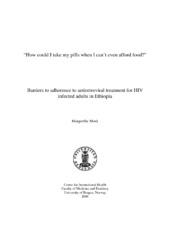"How could I take my pills when I can't even afford food?" Barriers to adherence to antiretroviral treatment for HIV infected adults in Ethiopia
Master thesis
Permanent lenke
https://hdl.handle.net/1956/8154Utgivelsesdato
2008-06-06Metadata
Vis full innførselSamlinger
Sammendrag
Problem statement: The regime of antiretroviral therapy (ART) which transforms HIV/AIDS from a deadly disease into a possible chronic condition has become increasingly available for a growing number of patients in sub-Saharan Africa. As the regime requires a strong level of adherence, there is a rising anxiety due to recent research which shows that a big proportion of patients who started on ART, are no longer in the program after two years. These findings underline the need to understand what kinds of challenges are faced by these patients related to the specific context in where they are situated. This study aims to look into the Ethiopian context where ART has been provided free of charge since 2005. Even though Ethiopia shares many characteristics related to adherence found in other sub-Saharan countries, the healing method by holy water in the Orthodox Church in relationship to ART is particular and is an issue for debate. Objectives: To identify major determinants associated with adherence of antiretroviral treatment among HIV infected adults in Ethiopia Methods: Most of the data collection was done in Dilla town in south Ethiopia. It was obtained during fieldwork which lasted from the10th of June to the 20th of August 2007. Experiences were recorded from patients and health providers in both governmental and nongovernmental organisations associated with the ART program in Dilla as well as from Orthodox priests were collected. Interviews were conducted among 19 patients, 10 health providers and 7 Orthodox priests. Documentary review, participant observation as well as one focus group discussion was also done. The data was analyzed using elements from The Framework Analysis. Results: Self-reported adherence is very high among the HIV patients interviewed. Poverty associated factors related to basic needs for food, shelter and employment turned out to be the major barriers to adherence. Though hampered by stigma and discrimination, access to ART and “wrap around” services facilitates disclosure of HIV status. Holy water is widely used by HIV patients and may both compete with and complement adherence to ART. Investment by international donors in training and technical support in HIV care is crucial for the ART programs and strengthens the health system in general Conclusions/Recommendations: HIV/AIDS care is strongly associated with poverty. HIV/AIDS must be treated in the context of economic development, access and right to treatment and strengthening of the general health system.
